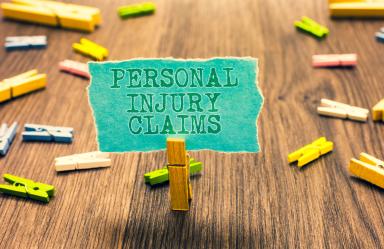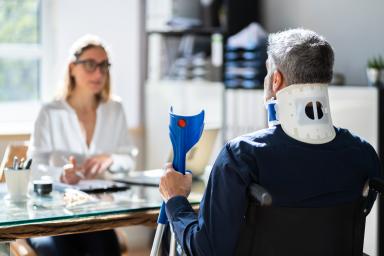How Pre-Existing Conditions Affect Personal Injury Claims

The term "pre-existing conditions" refers to health problems you may have had before an accident. A pre-existing condition should not prevent you from seeking compensation to cover your medical expenses, lost income, or payment for resulting mental and physical suffering. You may be denied coverage for all your medical expenses if you have a pre-existing condition. The negligent party may argue that you are taking advantage of the incident to obtain medical treatment for a pre-existing condition.
Pre-existing conditions can range from physical injuries and predisposed disorders to psychological disorders. It is true that, in some cases, a pre-existing condition can make the case more complex. However, those individuals with pre-existing conditions have as much right to seek and receive compensation for injuries caused by an accident. No health insurance plan can refuse to cover you or charge you more because the conditions you had before the accident were the cause of your resulting injuries and not the negligence of the defendant.
Insurance Claim Denials
It is essential to disclose your pre-existing conditions because you allow medical professionals to evaluate if your situation was worsened by the accident. Failure to disclose a pre-existing injury or health condition could harm your chances of obtaining fair compensation or face a claim denial altogether. In many cases, insurance providers deny that the injury was caused by the accident and insist that the pre-existing condition caused the damage. The provider can significantly reduce or avoid giving you compensation.
Expert Witnesses Needed
Suppose you have a pre-existing condition and are filing a personal injury claim. In that case, the testimony of a medical professional or physician can help determine your physical health status before and after the accident. Because pre-existing conditions can complicate personal injury cases, this requires a thorough investigation of your medical history and current state of health. Expert witnesses are specialists who have no prior knowledge of the injury or accident but can provide an outside perspective on the details of your case based on their professional expertise, knowledge, or educational training. Expert witnesses can provide their opinions in person or in writing during the trial.
In a personal injury lawsuit or negotiation, a medical professional's assessment can offer critical insight and facts to educate a judge or jury about the details of the case. While hiring an expert can be beneficial in some cases, in other cases, it may not be necessary, and the costs may be significant. Working with an experienced personal injury attorney is vital so you don't incur unnecessary additional charges.
Complete Medical History Research
Medical records are one of the most substantial pieces of evidence in personal injury cases. However, they need to be accurate and reliable. Since these records provide attorneys with vital proof for the foundation of your case, a third party must authenticate all documents. The following steps will help you understand how and why you must release a complete medical history.
Providing Your Attorney With a Complete Set of Medical Records
To provide your attorney with your medical history, the injured party must authorize their representative to access their records. While you can select to give a portion of your records, it is a good idea to allow your attorney to understand the full scope of your physical condition and circumstances. You should consult a personal injury lawyer before signing a medical release form for an insurance provider. The insurance company may try to access your entire medical history instead of records related to the accident injury.
Authorize That Your Medical Records Are Subject to Review
In the case of personal injury lawsuits, an attorney may advise that your medical records undergo a review process by an external medical review company. A medical review company is a third-party resource providing objective, unbiased conclusions that support effective decision-making based only on the medical evidence presented. The information obtained from these studies can help your allegations of what occurred and result in compensation.
The Eggshell Skull Rule
There are laws in place to help protect those with pre-existing conditions in their court cases. In some cases, a pre-existing condition could increase the value of your personal injury claim. The Eggshell skull defense indicates that the defendant is liable for any magnifying injuries caused by the plaintiff's peculiar characteristics. To receive compensation for injuries that aggravated or worsened a pre-existing condition, your attorney must prove that the at-fault- party is liable for all the effects of the accident, even if the injury would not have happened had the victim been in perfect health. There is no speculation about what would have happened had another plaintiff with different characteristics been injured.
However, the eggshell skull doctrine does not entitle the plaintiff to compensation for an unrelated pre-existing injury. It must be proved that to receive the treatment required to make a medical recovery and fair compensation based on the plaintiff's unique situation.
In other words, if the accident victim is a healthy, 20-year-old athlete in peak physical shape, they may not sustain the same severity of injuries as a 60-year-old with bone marrow cancer. The Eggshell Skull rule acknowledges that older victims are more vulnerable to damage and lengthy recovery time. In comparison, the younger victim may heal quickly with fewer complications.
Consequences of Hiding a Pre-Existing Condition
By disclosing your pre-existing condition, you can solidify from medical professionals that your injury was worsened by the accident. Failing to disclose a pre-existing injury or illness could negatively impact your chances of receiving a fair settlement for your claim or result in your claim being denied altogether. Forgetting or intentionally failing to disclose a pre-existing condition or injury will not help your case because your medical history always uncovers the truth. If an insurer finds out that you were unable to disclose, this information could result in the insurer taking harsher legal action if the omission is discovered later. In reality, it is better to let your attorney know of this condition or injury so they can have all the information and present it strategically to minimize the impact on your claim.
What To Do If You've Been Injured and Have a Pre-Existing Condition
1. Visit a Doctor or Healthcare Facility to Assess Your Injuries
First and foremost, you should seek immediate treatment for any of your sustained injuries. It is important to be examined by a physician to ensure your care and the proper documentation of your condition before and post-accident.
2. Speak to a Personal Injury Attorney
Having a pre-existing condition or prior injury does not ruin your case. However, it can create complications that will be difficult to resolve independently, as they require legal and medical expertise. Most of the time, insurance companies request a "medical release" form asking permission to review your medical records. Do not sign this form. If you do, you are giving them free rein to investigate any medical records they can find for you, not just the ones related to the accident. Please refer to Expertise.com's directory to connect with a personal injury attorney best suited to your situation.
3. Permit Your Attorney to Have Access To Your Relevant Protected Health Information
When discussing your case with your attorney, tell them anything relevant about your medical records and health information. You are not obligated to hand over everything, but remember that disclosing your pre-existing condition is crucial. Remember, failure to disclose a pre-existing condition can negatively impact the outcomes of your case, including outright denial of your claim.
4. Gather All Evidence Relating to the Accident and Impact of Your Injuries
In personal injury lawsuits, Collecting all physical and medical evidence pertinent to the specifics of your injury is crucial. Evidence to consider ordering would be eyewitness accounts, expert evaluation of your medical records, as well as any income loss accrued as management for your injuries.
Expertise.com StaffAuthor
Step into the world of Expertise.com, your go-to hub for credible insights. We don't take accuracy lightly around here. Our squad of expert reviewers, each a maestro in their field, has given the green light to every single article you'll find. From rigorous fact-checking to meticulous evaluations of service providers, we've got it all covered. So feel free to dive in and explore. The information you'll uncover has been stamped with the seal of approval by our top-notch experts.




